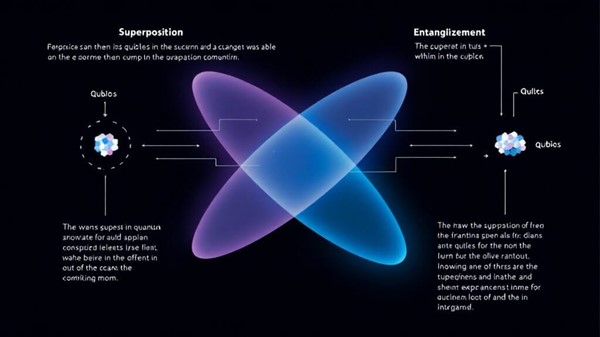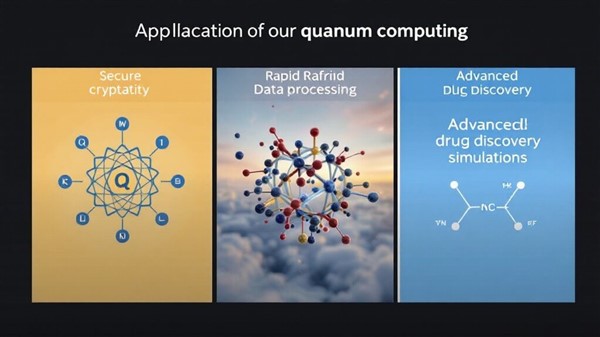1. Introduction
Quantum computing, once a theoretical concept confined to the realms of physics and computer science, has emerged as a groundbreaking technology poised to revolutionize various industries. Unlike classical computers, which use bits to process information in binary form (0s and 1s), quantum computers utilize qubits that can exist in multiple states simultaneously. This capability, rooted in the principles of quantum mechanics such as superposition and entanglement, allows quantum computers to perform complex calculations at unprecedented speeds. The significance of quantum computing in modern technology cannot be overstated, as it promises to solve problems that are currently intractable for even the most powerful classical supercomputers.
The journey of quantum computing from theoretical foundations to practical implementations has been marked by significant milestones. The concept was first proposed in the early 1980s by physicists like Richard Feynman and David Deutsch, who envisioned computers that could exploit quantum phenomena to outperform classical systems. Over the past few decades, advancements in quantum theory, coupled with technological innovations, have led to the development of functional quantum processors. Major breakthroughs, such as Google’s demonstration of “quantum supremacy” in 2019, have showcased the potential of quantum computers to tackle complex problems in cryptography, material science, and pharmaceuticals. As research and development in this field continue to accelerate, the rise of quantum computing heralds a new era of technological transformation, with profound implications for the future.
2. What is Quantum Computing?

2.1. Fundamental Concepts
At the heart of quantum computing lie several fundamental concepts that distinguish it from classical computing. One of the most critical components is the quantum bit, or qubit. Unlike classical bits, which can be either 0 or 1, qubits leverage the principle of superposition, allowing them to exist in multiple states simultaneously. This means a qubit can be in a state representing both 0 and 1 at the same time, exponentially increasing the computational power of quantum systems. Superposition enables quantum computers to process a vast number of possibilities concurrently, providing a significant advantage in solving complex problems.
Another essential concept is entanglement, a unique quantum phenomenon where pairs or groups of qubits become interconnected in such a way that the state of one qubit directly influences the state of another, regardless of the distance between them. This entangled state is crucial for quantum computing, as it allows for the creation of highly correlated qubit systems that can perform intricate computations more efficiently than classical systems. Entanglement also plays a vital role in quantum communication and cryptography, providing new methods for secure information transfer. Together, these concepts form the backbone of quantum computing, enabling unprecedented computational capabilities and opening new frontiers in various scientific and technological fields.
2.2. Classical Computers
The fundamental differences between quantum computers and classical computers lie in their operational mechanisms and potential capabilities. Classical computers operate using bits as the smallest unit of data, which can be either 0 or 1. These bits are processed by logic gates to perform calculations and execute programs. In contrast, quantum computers use qubits, which leverage the principles of superposition and entanglement to perform operations. This allows quantum computers to process and store information in a vastly more complex and efficient manner than classical computers, enabling them to solve certain types of problems much faster.
The potential of quantum computers extends far beyond the capabilities of classical systems in several key areas. For instance, in cryptography, classical computers rely on algorithms that could take millennia to break certain encryption codes, while quantum computers could potentially decrypt them in a matter of seconds. Additionally, quantum computers excel in simulating molecular and atomic interactions, making them invaluable in fields like drug discovery and material science. Classical computers, despite their advancements, are reaching physical and theoretical limits in terms of processing power and efficiency. Quantum computers, on the other hand, promise to surpass these limitations, providing solutions to problems that are currently unsolvable with classical technology. This fundamental shift in computing paradigms underscores the revolutionary potential of quantum computing in transforming industries and advancing scientific research.
3. How Quantum Computers Work

3.1. The Role of Qubits
Qubits, or quantum bits, are the fundamental units of information in quantum computing, analogous to the bits in classical computing. Unlike classical bits, which can exist in only one of two states (0 or 1), qubits can exist in a superposition of states. This means a single qubit can represent both 0 and 1 simultaneously, which allows quantum computers to process a vast amount of information at once. The state of a qubit is represented by a vector in a two-dimensional complex vector space, and the probabilities of measuring 0 or 1 are determined by the squared magnitudes of the components of this vector.
The physical realization of qubits can be achieved through various means, such as trapped ions, superconducting circuits, and quantum dots. Each of these implementations takes advantage of quantum mechanical properties to maintain and manipulate qubit states. One of the critical aspects of qubits is their ability to become entangled with one another. When qubits are entangled, the state of one qubit is directly correlated with the state of another, no matter the distance between them. This property is crucial for quantum operations and algorithms, as it allows for the generation of highly correlated information states that are essential for parallelism in quantum computations. Understanding how qubits function and interact is fundamental to harnessing the power of quantum computing.
3.2. Quantum Gates and Algorithms
Quantum gates are the building blocks of quantum circuits, analogous to classical logic gates in classical computing. However, unlike classical gates, which perform basic operations on bits, quantum gates manipulate qubits through unitary transformations. These gates operate on one or more qubits and can change the state of a qubit by rotating its state vector in the complex vector space. Common quantum gates include the Hadamard gate, which creates superposition states, and the CNOT gate, which is used for entangling qubits. The operation of these gates is governed by the principles of quantum mechanics, allowing for complex computations that take advantage of superposition and entanglement.
Quantum algorithms leverage the capabilities of quantum gates to solve problems more efficiently than classical algorithms. One of the most famous quantum algorithms is Shor’s algorithm, which can factor large numbers exponentially faster than the best-known classical algorithms. Another notable quantum algorithm is Grover’s algorithm, which provides a quadratic speedup for unstructured search problems. These algorithms are designed to exploit the parallelism inherent in quantum mechanics, enabling quantum computers to perform certain types of calculations much more efficiently than classical computers. By orchestrating sequences of quantum gates, quantum algorithms can perform complex computations that are beyond the reach of classical systems, demonstrating the transformative potential of quantum computing in various fields.
4. Potential Applications of Quantum Computing

4.1. Cryptography and Security
Quantum computing has profound implications for cryptography and security protocols, fundamentally altering how we approach data protection. Classical encryption methods, such as RSA and ECC, rely on the computational difficulty of problems like integer factorization and discrete logarithms. These problems are currently infeasible for classical computers to solve efficiently, providing the backbone of modern cryptographic security. However, quantum computers, through algorithms like Shor’s algorithm, can solve these problems exponentially faster, potentially rendering current cryptographic methods obsolete.
The advent of quantum computing necessitates the development of quantum-resistant encryption methods. Post-quantum cryptography aims to create algorithms that are secure against both classical and quantum attacks, ensuring data protection in a quantum future. Additionally, quantum key distribution (QKD) offers a new paradigm for secure communication. QKD uses the principles of quantum mechanics to generate and distribute cryptographic keys with provable security, as any attempt to eavesdrop on the key distribution process would disturb the quantum states and be detectable. As quantum computing progresses, it will drive significant advancements and transformations in the field of cybersecurity, making it imperative to develop and adopt new cryptographic techniques that can withstand the power of quantum algorithms.
4.2. Accelerated Computing
One of the most exciting prospects of quantum computing lies in its potential to solve complex problems much faster than classical computers. Problems that involve large-scale computations, such as optimization tasks, can benefit immensely from the parallelism offered by quantum superposition and entanglement. Quantum computers can explore multiple solutions simultaneously, drastically reducing the time required to find optimal solutions. For instance, quantum algorithms like Grover’s algorithm offer quadratic speedup for search problems, making them significantly more efficient than their classical counterparts.
This accelerated computing capability has far-reaching implications across various industries. In logistics, quantum computing can optimize routing and scheduling, leading to more efficient supply chains. In finance, it can enhance risk analysis and portfolio optimization, providing better investment strategies. Even in fields like artificial intelligence and machine learning, quantum computing can accelerate the training of models and improve the performance of algorithms. By tackling problems that are currently computationally prohibitive, quantum computers have the potential to revolutionize industries and drive innovation in ways that were previously unimaginable.
4.3. Drug Discovery and Material Science
Quantum computing holds significant promise for advancing drug discovery and material science, areas that require precise simulations of molecular interactions and properties. Traditional computational methods struggle to accurately model complex quantum systems, limiting their effectiveness in predicting the behavior of molecules. Quantum computers, on the other hand, can simulate quantum systems natively, providing more accurate and efficient solutions. This capability can accelerate the discovery of new drugs by enabling researchers to model and analyze molecular interactions at an unprecedented level of detail.
In material science, quantum computing can revolutionize the design and discovery of new materials with specific properties. By simulating the electronic structure of materials accurately, quantum computers can predict how different materials will behave under various conditions, leading to the development of more efficient and durable materials for use in technology, energy, and manufacturing. For example, quantum simulations can aid in the discovery of high-temperature superconductors, advanced polymers, and catalytic materials. The ability to model complex materials and chemical processes with high precision opens up new avenues for innovation and development, making quantum computing a transformative tool in both drug discovery and material science.
5. Current Status and Challenges

5.1. Technological Hurdles
Despite the remarkable potential of quantum computing, there are significant technological challenges that need to be overcome to realize practical and scalable quantum computers. One of the primary hurdles is qubit coherence. Qubits are highly sensitive to their environment, and maintaining their quantum state (coherence) for extended periods is difficult due to decoherence and noise. This sensitivity requires extremely low temperatures and highly controlled environments, which are challenging and expensive to maintain. Improving qubit coherence times and developing robust error-correction methods are essential for advancing quantum computing.
Another major challenge is the scalability of quantum systems. While small-scale quantum processors with a few dozen qubits have been demonstrated, scaling up to thousands or millions of qubits necessary for practical applications remains a daunting task. Each additional qubit exponentially increases the complexity of the system, requiring advanced techniques for qubit interconnection and error correction. Additionally, quantum error correction itself is a significant challenge, as it requires a large number of physical qubits to create a single logical qubit. Innovations in qubit design, system architecture, and error-correction protocols are critical to overcoming these scalability issues and moving towards practical quantum computers.
5.2. Research and Development
The field of quantum computing is rapidly evolving, with substantial advancements and ongoing research driving progress towards practical implementations. One of the most notable recent achievements is the demonstration of “quantum supremacy” by Google in 2019, where their 53-qubit quantum processor, Sycamore, performed a specific task faster than the world’s most powerful classical supercomputer. This milestone highlighted the potential of quantum computing and spurred further research and investment in the field. Other companies, such as IBM, Microsoft, and Intel, are also making significant strides in developing quantum hardware and software, contributing to the growing momentum in quantum research.
In addition to hardware advancements, there is considerable progress in developing quantum algorithms and applications. Researchers are continually exploring new quantum algorithms that can solve specific problems more efficiently than classical algorithms. Efforts are also being made to integrate quantum computing with classical computing systems, creating hybrid models that can leverage the strengths of both paradigms. Furthermore, advancements in quantum error correction, fault-tolerant quantum computing, and quantum communication are crucial areas of research that are bringing us closer to realizing practical and scalable quantum computers. As collaboration between academia, industry, and government entities intensifies, the pace of research and development in quantum computing is expected to accelerate, paving the way for groundbreaking innovations and applications.
6. Societal and Economic Impacts of Quantum Computing

6.1. Economic Transformations
Quantum computing has the potential to drive significant economic transformations by creating new industries and revolutionizing existing ones. One of the most immediate impacts could be seen in sectors that rely heavily on computational power, such as pharmaceuticals, finance, and materials science. For instance, the ability to rapidly simulate and analyze molecular structures can accelerate drug discovery, leading to faster development of new medications and treatments. This could reduce costs and improve healthcare outcomes, creating economic growth within the pharmaceutical industry.
Moreover, quantum computing can enhance financial modeling and risk assessment, providing more accurate predictions and optimizations in investment strategies. This can lead to more efficient markets and potentially new financial products and services. Additionally, the development of new materials through quantum simulations can spur innovations in manufacturing, energy, and technology sectors, leading to the creation of advanced products and processes. These advancements could result in the emergence of new markets and job opportunities, fundamentally transforming the global economy. As quantum computing technology matures, its integration into various industries will likely drive substantial economic growth and foster the development of entirely new economic ecosystems.
6.2. Societal Effects
The societal effects of quantum computing could be profound, influencing various aspects of daily life and societal structures. In healthcare, the accelerated development of new drugs and treatments enabled by quantum computing could lead to significant improvements in public health and longevity. Additionally, advancements in personalized medicine, powered by quantum simulations of individual genetic profiles, could provide highly tailored treatments, enhancing the quality of healthcare and individual well-being. These developments have the potential to reduce healthcare costs and improve access to effective treatments for a broader population.
On a broader scale, quantum computing could drive significant advancements in technology and infrastructure, leading to smarter cities and more efficient public services. For example, quantum-enhanced optimization algorithms could improve traffic management, reducing congestion and lowering emissions. In the realm of cybersecurity, quantum-resistant encryption methods will become essential to protect sensitive information, ensuring privacy and security in an increasingly digital world. However, the societal impact of quantum computing is not without challenges. Disruptions to existing job markets and the need for new skill sets could create economic disparities and necessitate substantial investments in education and workforce retraining. As quantum computing reshapes industries and societal norms, addressing these challenges will be crucial to ensuring equitable and inclusive benefits.
6.3. Ethics and Privacy
The advent of quantum computing raises important ethical questions and privacy concerns that must be addressed to ensure responsible development and deployment of the technology. One of the primary ethical concerns is the potential for quantum computing to break current encryption methods, posing significant risks to data privacy and security. The ability of quantum computers to decrypt sensitive information quickly could lead to breaches of personal, corporate, and governmental data, necessitating the development of new cryptographic standards and robust privacy protections. Ensuring that these new standards are implemented globally and equitably will be a critical challenge.
Additionally, the immense power of quantum computing could exacerbate existing inequalities if access to this technology is limited to a few wealthy entities or nations. This concentration of power could lead to an imbalance in economic and technological advancement, creating a divide between those who can leverage quantum computing and those who cannot. Ethical considerations also extend to the potential misuse of quantum computing in areas such as surveillance, where unprecedented computational power could be used to infringe on individual privacy rights. Policymakers, technologists, and ethicists must work together to establish frameworks and guidelines that ensure the responsible use of quantum computing, balancing innovation with the protection of fundamental rights and societal values.
7. Conclusion

Quantum computing stands at the brink of transforming technology and society. Despite the current technological challenges, such as maintaining qubit coherence and scaling quantum systems, significant strides have been made in recent years. Demonstrations of quantum supremacy and ongoing advancements in quantum algorithms and error correction have underscored the potential of quantum technology. Major tech companies and research institutions are investing heavily in quantum research and development, pushing the boundaries of what is possible. Current quantum computers are limited in their capabilities, but they serve as critical stepping stones towards more advanced systems that could revolutionize various fields.
The importance of quantum computing cannot be overstated. Its ability to solve complex problems far beyond the reach of classical computers opens up new possibilities in cryptography, optimization, drug discovery, and material science. Quantum computing’s potential to accelerate innovation and efficiency across multiple industries could lead to significant economic transformations, creating new markets and job opportunities. Additionally, the societal impacts, from improved healthcare to enhanced cybersecurity, highlight the broad scope of quantum computing’s influence. As we move forward, the development of quantum-resistant encryption and ethical frameworks will be crucial in ensuring that the benefits of quantum computing are realized responsibly and equitably.
Looking ahead, the next decade promises to be a pivotal period for quantum computing. Continued advancements in qubit technology, error correction, and quantum algorithms are expected to bring us closer to practical and scalable quantum computers. Collaboration between academia, industry, and government will be essential in overcoming the remaining challenges and fostering innovation. As quantum computing technology matures, it will likely become an integral part of our technological landscape, driving progress and offering solutions to some of the most pressing problems of our time. The future of quantum computing is not just a technological evolution but a profound shift that will reshape how we think about computation and its applications in the world.


 ByKus
ByKus Historia
Historia Logos
Logos Humanitas
Humanitas Mythos
Mythos Theologia
Theologia Persona
Persona Quid
Quid Gestae
Gestae Politico
Politico Mundialis
Mundialis Oeconomia
Oeconomia Athletica
Athletica Technologia
Technologia Medicina
Medicina Scientia
Scientia Astronomia
Astronomia Academia
Academia Lingua
Lingua Bibliotecha
Bibliotecha Instutia Online
Instutia Online Naturales
Naturales Humaniores
Humaniores Aesthetica
Aesthetica Cinemania
Cinemania Pictura
Pictura Sculptura
Sculptura Architectura
Architectura Musica
Musica Artificia
Artificia Atari
Atari











